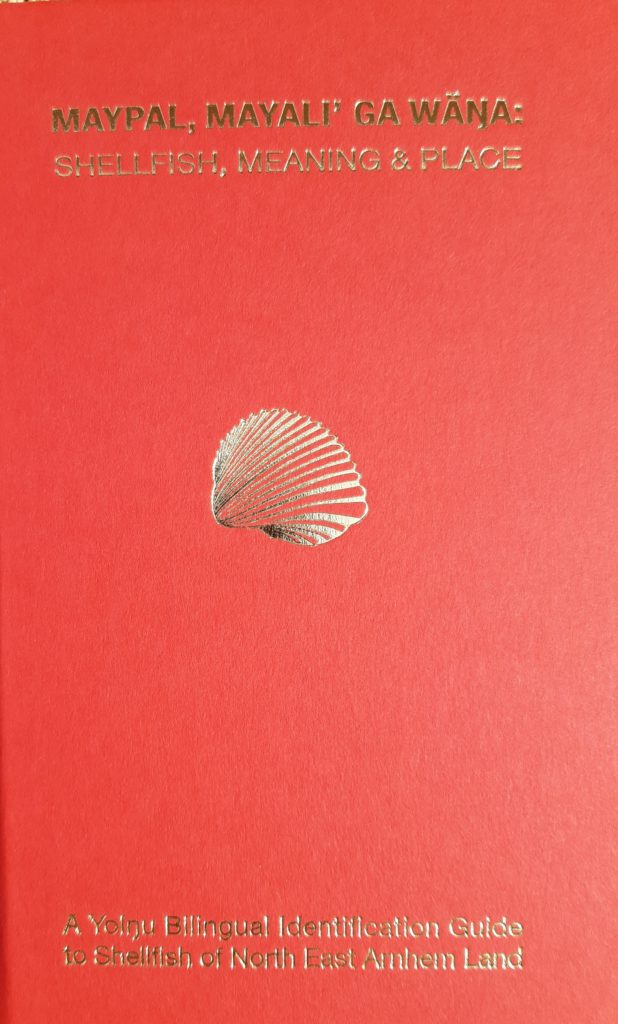Photographs of hand signs © Therese Ritchie. Book designed and illustrated by Therese Ritchie.
Hand photography © David Hancock/Skyscans. All images are copyrighted to designated authors, any use of the images to be negotiated with those authors.

At 21 cm. and 273 pages, Maypal is a uniquely sumptuous and scientifically precise, alphabetically organised, visual field guide to all the historical and most recently updated scientific, common and Yolŋu names of Arnhem Land shellfish and invertebrates in a number of Yolŋu languages, Latin and English. It includes full colour illustrations, colour maps and keys to identification, cross referenced into ecological zones and Yolŋu bilingual alphabetical order. I.D by world expert Dr R. Willan. It also features hitherto unrecorded beautifully translated ancestral poetry of shellfish in six languages by eminent Yolŋu. It has rich illustrations of seasonal availability and wind directions with detailed descriptions and examination of commensurability in scientific and Yolŋu world views. With photographs from Lloyd W Warner, Donald Thomson and David Hancock and lustrously designed by Therese Ritchie, it is a masterpiece of cross-cultural collaboration, bound in gold leaf. Only 15 copies remain in the author’s collection. All others handed out to Schools and Homelands across Arnhem Land.
$750.00
Yolŋu classifications of local shellfish types throw into stark relief the differences between indigenous knowledge systems and those of the western sciences. Systems of knowledge are embedded in distinctive worldviews that are often incommensurable with others, but within themselves, they are wholly coherent. Knowledge and practices maintained by peoples with extended histories of intimate coexistence with their environments typically emphasize symbiotic and spiritual connectedness to place. Such thinking tends to link people, animals, plants and other elements of the cosmos through social relations and engender systems that look and feel very different from the formal conventions of modern western style sciences. What may appear ambiguous from a purely scientific perspective may reveal a magnificent pattern of intimate and holistic connection where colour, shared habitat or mythological origin inform the logic of classification.
You must be logged in to post a review.
$750.00
Photographs of hand signs © Therese Ritchie. Book designed and illustrated by Therese Ritchie.
Hand photography © David Hancock/Skyscans. All images are copyrighted to designated authors, any use of the images to be negotiated with those authors.
Anthropologist Tommaso Piva. D.p.s –
Anthropologist, Tommaso Piva. D.p.s, declares; ‘Questo lavoro è una testimonianza della cura e dell’impegno reciproco,un’ espressione di autentico amore, speranza e sentimento verso la propria terra.’(Piva 2016)
‘This work is testament to truth, trust and care in engagement, a collaboration of profound love, hope and feeling in country.’
David Hancock Photographer –
For Yolŋu people, language and country are connected parts of a sacred inheritance, the wellspring of knowledge, wisdom and a truly priceless possession. This wisdom is reflected here in this collection in the Yolŋu names, poetry and ecological associations of maypal.”
Will Stubbs –
Will Stubbs of Buku-Larrŋgay Mulka Arts in Yirrkala says Maypal, Mayali’ ga Wäŋa : Shellfish Meaning and Place. A Yolŋu Bilingual Identification Guide to Shellfish of North East Arnhem Land;
“It has the weight and feel of a prayer book. And in a way it is -It is a reverence for these sacred foodstuffs that define and sustain the magical coast that we live on. But instead of that handful of species that we sleepwalkers can name there are over two hundred pages of individual edible Maypal with multiple Yolŋu names, their Latin tag and where available an English Common name.
It is a prayer that the existence of this knowledge and these names be infinite. It is a ritual incantation of this knowledge and these names that they may live on in the hearts and minds of the people who live with them for eternity.”